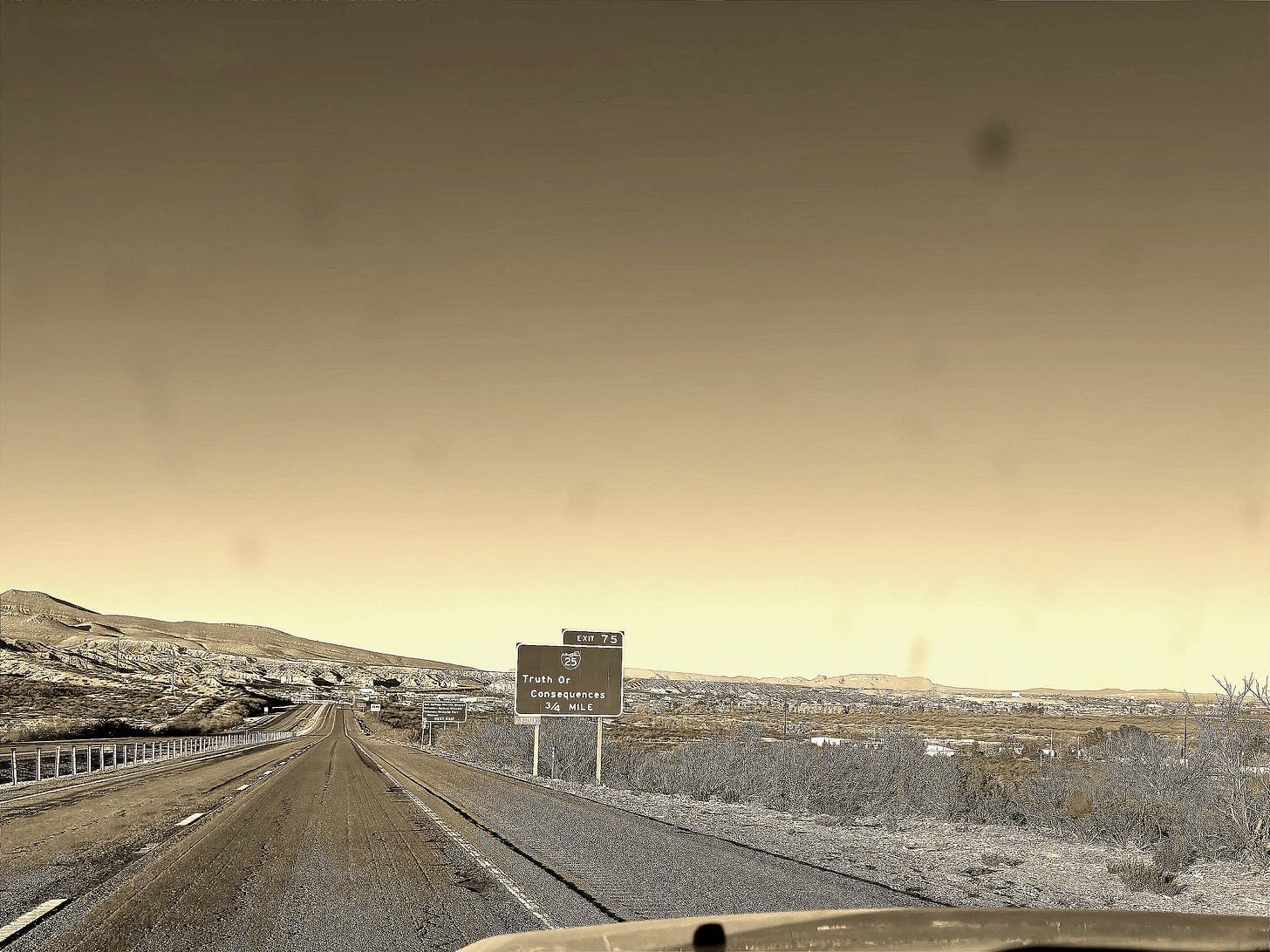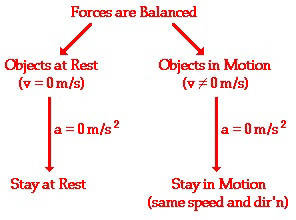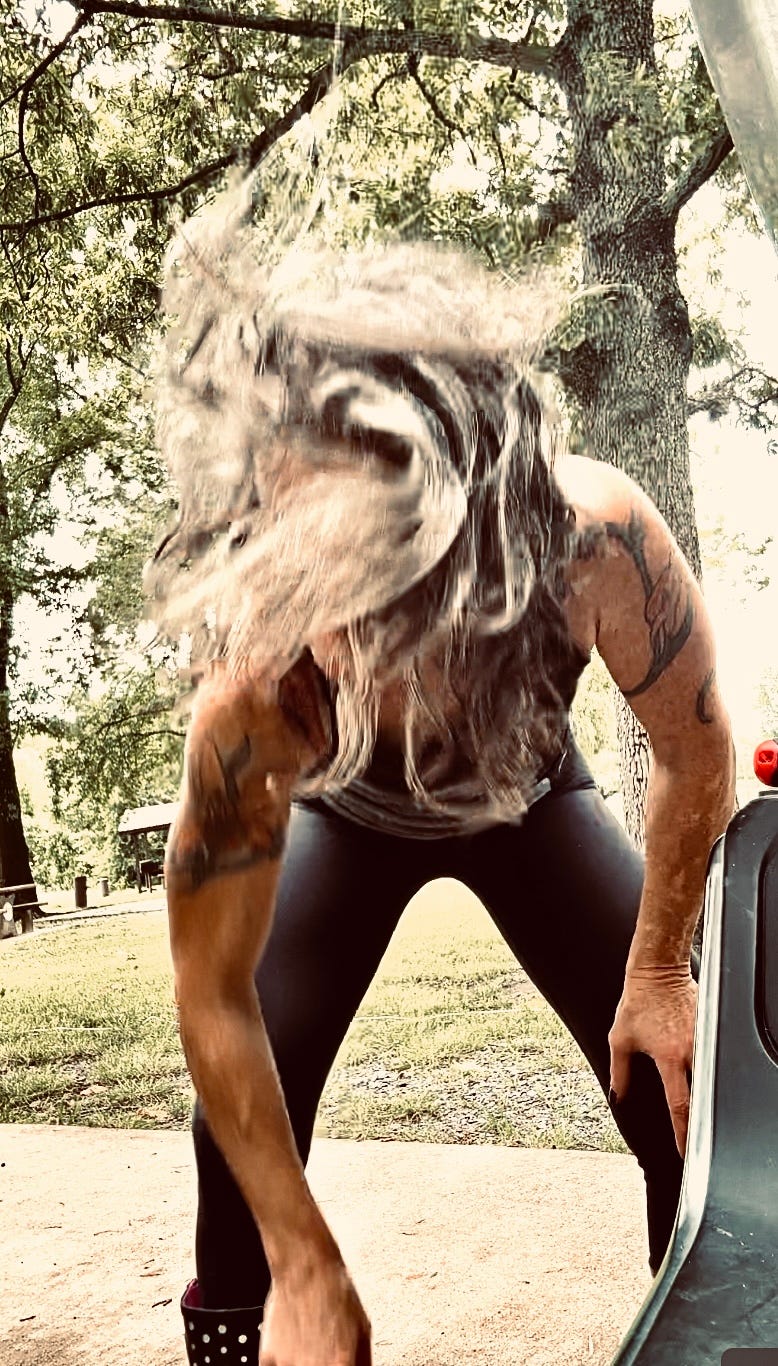The First Law of Going Solo
1. Let (poetry) equal force
It would have been 1995, maybe. I was driving east to west in heavy rain, faster than the state patrol felt was strictly necessary. The trooper stood peering in the passenger window, rain dripping off the brim of his hat. I wanted to tell him he looked bedraggled but did not. This was not the first time I'd found myself trying to explain my behavior to a uniformed person by way of poetry - I'd been thinking about a poem, wasn't paying attention to my speed - nor would it be the last.
What's the rush?
No rush.
Where you headed?
West.
He wrote me a ticket, told me to watch it with the lead foot, sent me on my way. I puttered along I-94, window open just a little so I could listen to the rain and the hiss of wheels on the road, writing a poem in my head and thinking about the fact that it must be very convenient for songwriters that last call rhymes so neatly with eight ball and sets them up, generation after generation, to stay just barely within rhyme scheme by breaking a line at fall
in love.
Or apart, I suppose. Fall
apart works just as well.
…where that force can encounter an object.
Newton's First Law - that an object in motion tends to stay in motion, and an object at rest tends to stay at rest - is appealing, as metaphors go.
But as nice and neat a metaphor as Newton's First Law provides, the fact is that no matter the object - whether the one in motion or the one at rest - the law describes the process, not the object itself.
If logic were poetry - if science, if physics, were language - the rule would describe the object, the body itself. It would describe a characteristic of that object, that body. It would lend itself more neatly to story, to lyric, to poetry: the parallel would be exact, a 1:1 ratio of metaphor to material fact.
A woman in motion tends to stay in motion.
But logic isn't poetry, as much as one might find the gloriousness of the mathematical term an elegant equation so great it makes one nearly faint, the metaphor-to-material-fact ratio is imprecise, less tidy couplet and more unsettling slant rhyme.
Newton's First Law of Motion describes the process by which the body moves or does not - inertia - not the body itself. It describes the forces that act on that body, and the conditions under which its trajectory can change.
2. And let a woman be an object
It would definitely have been 1997 when I read something - I don't remember what, an article, a short story, a book - that put a bee in my bonnet about a novel I wanted to write, the structure of which would be modeled on the interaction of subatomic particles.
That was the year I was full of novels. I had novels coming out my ears, some with characters named Kate, some with lovers named Kate and Elsa, both of whom were married to men who were boring, one that opened with a woman sitting at a small table in the Crystal Court of the 50-story IDS building in Minneapolis when someone smashed through the glass ceiling that flooded the court with winter light.
In any case, at one of the wine-soaked dinner parties that for disastrous reasons which do not bear further explication were a fixture of the late 1990s' artsy-fartsy/bookish/quasi-intellectual social subcultures in certain cities, I announced that I would write a novel in which the characters were assigned the role of various particles, though I had not yet decided whether the reader would be aware of this immediately or whether the structural underpinnings would be allowed to unfold.
The other gathered Foucault-citing semi-literati drunks in self-referential glasses agreed that the action of the novel should - really, it only could - be set in motion by the appearance of a free radical on the scene.
…where the object is at rest.
The woman who resembled Elsa stood in the kitchen while I plated dessert and our boring husbands melted slowly off their chairs in the living room with the other gathered louts. She gestured at me with her wineglass and, droll voice dripping with merlot, said, "You're the free radical, of course."
I laughed slightly and dropped a fistful of silver dessert forks on a china plate with an ear-splintering clang.
And for that matter, the law is usually citied only in part, precisely because we like it more as a metaphor than as a material fact. Newton's First Law is conditional; the conditions required for inertia to hold true are contained in the part of the law that poets are prone to leave out.
Here is the whole thing, as it’s generally cited: An object at rest stays at rest and an object in motion stays in motion with the same speed and in the same direction unless acted upon by an unbalanced force.
The object, the body, does not begin in motion; it is set in motion by something else. Its behavior - its trajectory, say, or the speed at which it travels along that path - is determined by the introduction of imbalance, by the action of an outside force. The same holds true of an object that holds still: it does not begin in stasis; it encounters something that keeps it static.
A woman held still tends to keep holding still.
But see, this is where metaphor fails.
Human beings are not, of course, objects; we are not merely passive bodies acted upon, moved by forces outside ourselves. The path we trace in a life is not drawn out for us in advance, or I don't believe it is. We have agency, free will.
And yet -
What is it, then, that determines our trajectory, our velocity, our force? Do we really just clack and ping at random through the pinball game of our lives?
Or is there some quality inherent to the object itself, the body, that makes one more prone to motion, one more prone to rest?
3. Let the vector quantity of (poetry) be > the static force
When I think about going solo - when I think about the way I live, and why - I'm not really thinking about relationships, not primarily.
I'm thinking about motion.
I'm thinking about patterns of motion, the impulse toward motion, direction and speed.
I'm thinking about where I am, where I want to go, where I will go, where I could. Which direction to take, which way to turn, what force might force the turning, what factor could compel staying the course.
I’m thinking about freedom of movement, free will, body autonomy, choice.
One night, when I’d just come home after months on the road for work, I sat on the floor of the living room with my husband, taking a break from packing up the marriage and the future, the wineglasses and dessert forks, the dusty books and the delicate china plates. We drank and talked. There was no rancor; the split wasn't angry, merely obvious. He wanted - with good reason - a wife who wasn't always gone, and I was always gone.
I asked him what he'd been thinking, anyway, marrying me.
He glanced up from the bottle of wine - he was picking at the label - and smiled, a little embarrassed. "I thought marriage would settle you down," he said.
We stared at each other.
Then we burst out laughing. We laughed so hard and for so long we remembered why we'd fallen in love in the first place, we fell in love all over again, we got married and threw dinner parties and soaked our heads in cabernet and started fighting and had affairs and watched the marriage collapse in time-elapse right then and there, sitting among the heaps of books and objects of beauty on the living room floor, sifting through the ruins of a dream, and when we finally stopped laughing it was time for me to go, so I left.
where stasis = (gravity + time).
Solo life isn't a matter of whether one chooses partnership or doesn’t, whether one loves or allows oneself to be loved. It's not a choice between lonely or not lonely, nor between absolute self-sufficiency or its absolute inverse. It's not about whether I can build my own fire or change my own tire or protect myself from the people who ask me whether I need someone to protect me or find my way without a map. It's not a matter of whether, once in a while, on very cold nights, in a polar vortex in a pickup truck on a windy night on a remote road in the far reaches of the Plains, I understand why the phrase someone to keep you warm at night is a way of talking about love.
The term 'solo' refers to my stance on partnership only secondarily. That stance is much more a function of the primary fact of solo life: I am an object in motion, and I tend to stay that way.
I travel not to go anywhere, but to go. I travel for travel’s sake. The great affair is to move.
—Robert Louis Stevenson







Beautiful. The part with your husband reminds me of a line from Richard Thompson’s “Beeswing” :
“And they say she even married once
A man named Romany Brown
But even a Gypsy caravan
Was too much settling down.”
Just brilliant. and when i thought i could not love you anymore; i read on ... and did... and continue to do so. i love you more today than yesterday...🎶